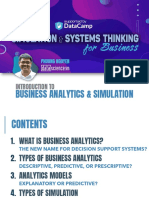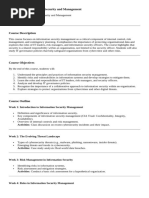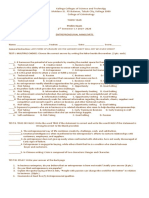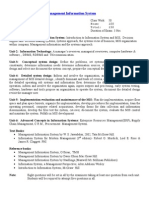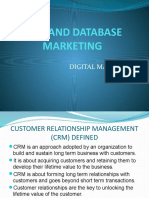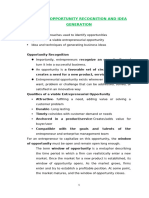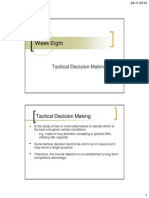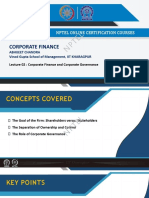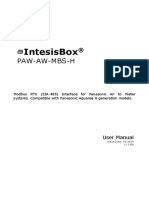Advanced Business Analytics
Uploaded by
vini2710Advanced Business Analytics
Uploaded by
vini2710Trimester III
Subject Title: Advanced Business Analytics Subject Code: RBA-09
After completing this course, students will be able to:
S. No. Course Outcomes
1 Understand the importance of data modelling in business decision making
2 Familiarize themselves with application of Business Analytics in Simulating and
Forecasting Business Scenarios
3 Data Mining and Different types of Optimization
4 Decision Analysis
Pre-Requisites
1. Familiarity of basic tools like MS EXCEL, SPSS
2. A course in Fundamentals of Business Analytics
Attitude:
1. Urge to learn new techniques which can help in corporate life
Topics to be covered:
Unit Session
Contents Chapter Outcome
No (in Hours)
1 Simulation and Risk Analysis Students will learn how 6
Analyzing risk in business to understand random
decisions uncontrolled behavior
Monte Carlo simulations among customers and
Significance of ‘flaw of its effect on business
averages’ Students will also
Correlate uncertain variables in understand the risk
a simulation model using Risk factors in business and
Solver Platform how to mitigate the
same
2 Introduction to Data Mining Understand the Solver in 6
Define data mining and some Excel and its
common approaches using data applications
mining Introduction to the
Use of cluster analysis to concepts of Hadoop for
explore and reduce data Data Mining
Use XLMiner or Solver in Introduction to R and
Excel to determine k-nearest Python for Data
neighbors, discriminant Analysis
analysis, logistic regression and
market basket analysis
3 Linear Optimization/Programming Students will 4
and its Applications understand Linear
Develop a mathematical model Optimization/Programm
for an optimization problem ing and the use of
Using Solver to solve linear Solver in Excel to
optimization models in Excel analyze Linear
What-if analysis of optimization Optimization/Programm
models ing
Interpret Sensitivity Report
4 Integer Optimization Students will learn 4
Recognize when to use integer different integer
variables in optimization optimization analysis
models and models
Develop integer optimization
models for practical
applications
5 Non-Linear and Non-smooth Students will learn the 4
Optimization use of nonlinear
Recognize when to use optimization models
nonlinear optimization models and non-smooth
Identify non-smooth optimization models
optimization models and their applications
Formulate and solve sequencing
and scheduling models using
Solver
6 Decision Analysis Students will 6
Characterize decisions with familiarize themselves
uncertain outcomes with Decision Analysis
Construct a payoff table
Risk profile analysis
Concept of Decision trees
Total 30
Textbooks
Business Analytics, James R Evans, Pearson (2e)
Reference Books
Business Analytics for Managers, Laursen & Thorlund, John Wiley & Sons
Data Analytics: The Ultimate Beginner's Guide to Data Analytics by Edward Mize
Big Data Analytics by Shankarmani & Vijayalakshmi, WIley
Business Analytics: The Science of Data Driven Decision Making
You might also like
- MB760 - MB770 - MPS5502 - Maintenenance Manual - 1 - of - 2 - R10 PDF100% (1)MB760 - MB770 - MPS5502 - Maintenenance Manual - 1 - of - 2 - R10 PDF181 pages
- Chapter-2: Market Sensing: Generating and Using Knowledge About The Market Submitted To:prepared by100% (1)Chapter-2: Market Sensing: Generating and Using Knowledge About The Market Submitted To:prepared by28 pages
- Effective Execution: Building High-Performing OrganizationsFrom EverandEffective Execution: Building High-Performing OrganizationsNo ratings yet
- Advanced Analytics: The Next Wave of Business IntelligenceNo ratings yetAdvanced Analytics: The Next Wave of Business Intelligence17 pages
- Slide - INTRODUCTION BUSINESS ANALYTICS & SIMULATIONNo ratings yetSlide - INTRODUCTION BUSINESS ANALYTICS & SIMULATION47 pages
- Lesson 3 Requirements Engineering and Analysis100% (1)Lesson 3 Requirements Engineering and Analysis20 pages
- Syllabus for Information Security and ManagementNo ratings yetSyllabus for Information Security and Management4 pages
- EEC5001 - Managerial Economics Syllabus: Fall 2015No ratings yetEEC5001 - Managerial Economics Syllabus: Fall 20152 pages
- 2 Business Processes and Business Logic PDFNo ratings yet2 Business Processes and Business Logic PDF11 pages
- Case Study Credit and Collection in Business Transactions IVANROWINJIMENEZ EmeNo ratings yetCase Study Credit and Collection in Business Transactions IVANROWINJIMENEZ Eme2 pages
- F. L. Vargas College Tuguegarao City Master in Public and Business Management Syllabus in Financial Management100% (1)F. L. Vargas College Tuguegarao City Master in Public and Business Management Syllabus in Financial Management4 pages
- Monetary Policy and Central Banking A.Y. 2024-2025No ratings yetMonetary Policy and Central Banking A.Y. 2024-202517 pages
- Security Threats To E-Commerce - Electronic Payment System - E-Cash - Credit-Debit CardsNo ratings yetSecurity Threats To E-Commerce - Electronic Payment System - E-Cash - Credit-Debit Cards3 pages
- Introduction of Retail Banking Products in MarketNo ratings yetIntroduction of Retail Banking Products in Market30 pages
- Application of Data Analytics in Business PDFNo ratings yetApplication of Data Analytics in Business PDF1 page
- Bsu 305 Business Research Methods NotesNo ratings yetBsu 305 Business Research Methods Notes116 pages
- Kalinga Colleges of Science and Technolgy Moldero St. P5 Bulanao, Tabuk City, Kalinga 3800 College of Criminology Third YearNo ratings yetKalinga Colleges of Science and Technolgy Moldero St. P5 Bulanao, Tabuk City, Kalinga 3800 College of Criminology Third Year3 pages
- Automatic Wiper System: Shantanu Dharmadhikari, Naeem Tamboli, Nilesh Gawali, Prof. N. N. LokhandeNo ratings yetAutomatic Wiper System: Shantanu Dharmadhikari, Naeem Tamboli, Nilesh Gawali, Prof. N. N. Lokhande4 pages
- Reading Material - Module-4 - Portfolio Optimization and AnalyticsNo ratings yetReading Material - Module-4 - Portfolio Optimization and Analytics23 pages
- Syllabus ACC535M Management Accounting and ControlNo ratings yetSyllabus ACC535M Management Accounting and Control8 pages
- Omt Proposed Curriculum 2018 (Rationale)No ratings yetOmt Proposed Curriculum 2018 (Rationale)4 pages
- ACFM Unit 5 Ethical and Governance Issues100% (1)ACFM Unit 5 Ethical and Governance Issues12 pages
- Chapter 6: Internet Technologies and Search Strategies: Prepared by Dr. Derek Sedlack, South University100% (1)Chapter 6: Internet Technologies and Search Strategies: Prepared by Dr. Derek Sedlack, South University43 pages
- Data Warehousing Business Intelligence Syllabus - 1921-T5 PDFNo ratings yetData Warehousing Business Intelligence Syllabus - 1921-T5 PDF7 pages
- Week 2 Entrepreneurship Process - 014655No ratings yetWeek 2 Entrepreneurship Process - 01465517 pages
- 19 - Competitive and Collaborative Strategies100% (1)19 - Competitive and Collaborative Strategies17 pages
- Kuldeep10119015pi 131028193336 Phpapp01No ratings yetKuldeep10119015pi 131028193336 Phpapp0123 pages
- Cashflowstatement 150402074118 Conversion Gate01No ratings yetCashflowstatement 150402074118 Conversion Gate0130 pages
- MA 1.2-Fundamentals of Managerial AccountingNo ratings yetMA 1.2-Fundamentals of Managerial Accounting45 pages
- Module 8. Introduction To Cost & Managerial Accounting04.05.2012No ratings yetModule 8. Introduction To Cost & Managerial Accounting04.05.201250 pages
- Module 12. Cost Volume Profit Analysis 22.06.2012No ratings yetModule 12. Cost Volume Profit Analysis 22.06.201236 pages
- STAT14S - PSPP: Exercise Using PSPP To Explore Bivariate Linear RegressionNo ratings yetSTAT14S - PSPP: Exercise Using PSPP To Explore Bivariate Linear Regression4 pages
- RSA6100A RSA5100A Signal Analyzers Programmer ManualNo ratings yetRSA6100A RSA5100A Signal Analyzers Programmer Manual1,509 pages
- Division of Ilocos Norte Electronics Product Assembly and Servicing Week 3 - 4 MultitesterNo ratings yetDivision of Ilocos Norte Electronics Product Assembly and Servicing Week 3 - 4 Multitester4 pages
- (Ebook) VLSI design by Das, Debaprasad ISBN 9780198094869, 9781680158717, 0198094868, 1680158716 - Download the ebook now for instant access to all chaptersNo ratings yet(Ebook) VLSI design by Das, Debaprasad ISBN 9780198094869, 9781680158717, 0198094868, 1680158716 - Download the ebook now for instant access to all chapters51 pages
- Manual PAW-AW-MBS-H User Manual v1.2 r1.3 enNo ratings yetManual PAW-AW-MBS-H User Manual v1.2 r1.3 en21 pages
- Lecture 6 - Industrial Instrumentation and Actuators - 3No ratings yetLecture 6 - Industrial Instrumentation and Actuators - 328 pages
- TELECOM 2G 3G 4G RF IPv6 Study Materials PDFNo ratings yetTELECOM 2G 3G 4G RF IPv6 Study Materials PDF3 pages
- Sample Technical Report: Measurement and ErrorNo ratings yetSample Technical Report: Measurement and Error10 pages
- Tutorial: Incisive Enterprise Specman Elite TestbenchNo ratings yetTutorial: Incisive Enterprise Specman Elite Testbench104 pages
- Service Manual Lexmark X264 - X363 - X364 - 7013No ratings yetService Manual Lexmark X264 - X363 - X364 - 7013244 pages









